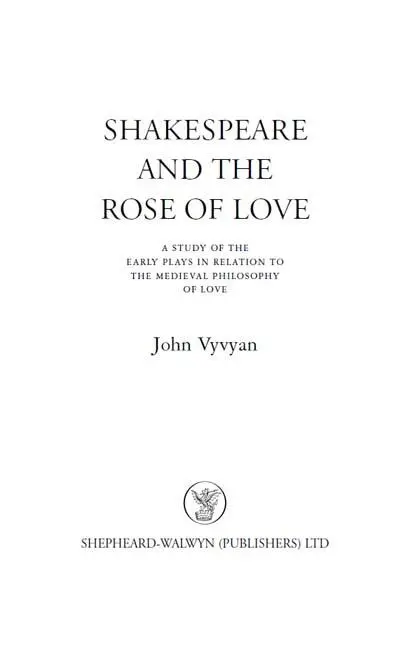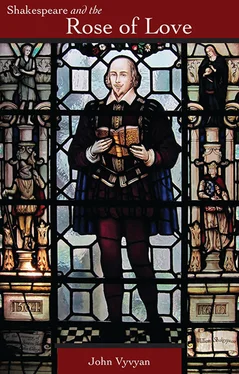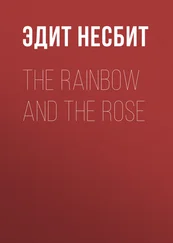
By the same Author
THE SHAKESPEAREAN ETHIC
SHAKESPEARE AND PLATONIC BEAUTY

© The Estate of John Vyvyan 2013
All rights reserved. No part of this book may be reproduced in any form without the written permission of the publisher, Shepheard-Walwyn (Publishers) Ltd
First published in 1960 by
Chatto & Windus, London
This edition published 2013 by
Shepheard-Walwyn (Publishers) Ltd
107 Parkway House, Sheen Lane,
London SW14 8LS
www.shepheard-walwyn.co.uk
British Library Cataloguing in Publication Data
A catalogue record of this book is available from the British Library
ISBN: 978-0-85683-293-2
Cover design by ML Design, London ( www.ml-design.co.uk)
Based on a stained glass window reproduced courtesy of
The School of Economic Science, London
Photography © Richard Wythe
Typeset by Alacrity, Chesterfield, Sandford, Somerset
Printed and bound in the United Kingdom
by Short Run Press Ltd, Exeter
Publishers’ Note Publishers’ Note THIS IS AN entirely new edition of the second of John Vyvyan’s three insightful books on the philosophy of Shakespeare. It is new in that the entire text has been reset, but without alteration, in the same style as our edition of The Shakespearean Ethic . However, here too some additions have been made which we hope will enhance the usefulness of this edition. Having been educated in Switzerland, John Vyvyan was clearly familiar with the great literature of Italy, France and Germany and has sometimes quoted phrases or passages in the original language. In many cases he gave his own translation or paraphrased the quote. There are, however, some instances where we have felt it helpful, for the benefit of readers less familiar with these languages, to provide some translations as footnotes. We appreciate that translations can never be as apt as the original but we hope they will be useful. Vyvyan illustrates his argument with many quotations from Shakespeare’s plays. To assist in finding where they appear in the respective plays, we have listed the first line of the quotations at the end of the book and relied on the Oxford University Press edition of The Complete Works for the references. Writing of the Romance of the Rose, Vyvyan uses Chaucer’s translation. To assist readers, a short glossary of Chaucerian English is provided, which we hope will be helpful. There is also a short list of the books to which Vyvyan refers. Finally, the index has been considerably enlarged. The Publishers would like to thank the Newman Trust in Dublin for their support in making possible this new edition. Happily, since we published The Shakespearean Ethic , we have traced the copyright owner, John Vyvyan’s son.
1 The Terentian Pattern
2 Love’s Labour’s Lost
3 The Romance of the Rose
4 The Two Gentlemen of Verona
5 Terence Elaborated
6 Romeo and Juliet
7 Conclusion
Author’s Shakespearean References
Author’s Other References
Chaucer Glossary
Index
For nothing this wide universe
I call, Save thou, my rose; in it thou art my all.
SHAKESPEARE
Is mihi ‘Lascivi’ dixit ‘praeceptor Amoris, duc, age, discipulos ad mea templa tuos, est ubi diversum fama celebrata per orbem littera, cognosci quae sibi quemque iubet. Qui sibi notus erit, solus sapienter amabit atque opus ad vires exiget omne suas.’
‘Come, thou preceptor of light love, and lead thy pupils to my temple. Thereon, is an inscription famed throughout the earth that commands each to know himself. Only he who knows himself will love with wisdom, and according to his powers, perform love’s work in full.’
OVID
THIS IS AN entirely new edition of the second of John Vyvyan’s three insightful books on the philosophy of Shakespeare. It is new in that the entire text has been reset, but without alteration, in the same style as our edition of The Shakespearean Ethic .
However, here too some additions have been made which we hope will enhance the usefulness of this edition. Having been educated in Switzerland, John Vyvyan was clearly familiar with the great literature of Italy, France and Germany and has sometimes quoted phrases or passages in the original language. In many cases he gave his own translation or paraphrased the quote. There are, however, some instances where we have felt it helpful, for the benefit of readers less familiar with these languages, to provide some translations as footnotes. We appreciate that translations can never be as apt as the original but we hope they will be useful.
Vyvyan illustrates his argument with many quotations from Shakespeare’s plays. To assist in finding where they appear in the respective plays, we have listed the first line of the quotations at the end of the book and relied on the Oxford University Press edition of The Complete Works for the references.
Writing of the Romance of the Rose, Vyvyan uses Chaucer’s translation. To assist readers, a short glossary of Chaucerian English is provided, which we hope will be helpful. There is also a short list of the books to which Vyvyan refers. Finally, the index has been considerably enlarged.
The Publishers would like to thank the Newman Trust in Dublin for their support in making possible this new edition.
Happily, since we published The Shakespearean Ethic , we have traced the copyright owner, John Vyvyan’s son.
IN 1584, at the age of twenty, Shakespeare left Stratford – a fugitive, perhaps, from the heavy-handed justice of Sir Thomas Lucy. What became of him for the next few years is unknown. As his earliest work cannot be dated with certainty, the length of this interval is not agreed upon. But by 1592 he had already made his mark in the London theatre – ‘an upstart crow’, in the malicious words of poor Greene, ‘that is in his own conceit the only Shake-scene in a country’. So however Shakespeare had spent the missing years, they would seem to have been conducive to his self-assurance.
Almost everything that a young Elizabethan might have done has been imagined of him in those eight years. In an age when brilliant panache was esteemed a virtue, it is likely that he did his best to give them colour; and one of the striking things about the early plays is the social accomplishment they imply in their author. From the first, he writes of high circles as if he felt at home in them, with confidence and fluency. In Love’s Labour’s Lost , he treats of the trivialities that are much harder to counterfeit than the formalities of society; and it does not appear that he ever blunders. That part of his Wanderjahre *were spent, therefore, in a nobleman’s household – where patronage may have ripened into friendship – seems to be a reasonable guess. But we do not know.
There is one fact, however, that I should like to stress: the earliest work that is certainly Shakespeare’s is that of an experienced man. Twenty-eight is a late beginning for genius; many poets have reached their apogee by then. At that age, Keats was already dead and Shelley had only two more years to live. Therefore, although the plays of Shakespeare’s first period show that he had an immense amount to learn in the art of expressing his ideas, we should not be surprised that their thought-content is mature.
Читать дальше













